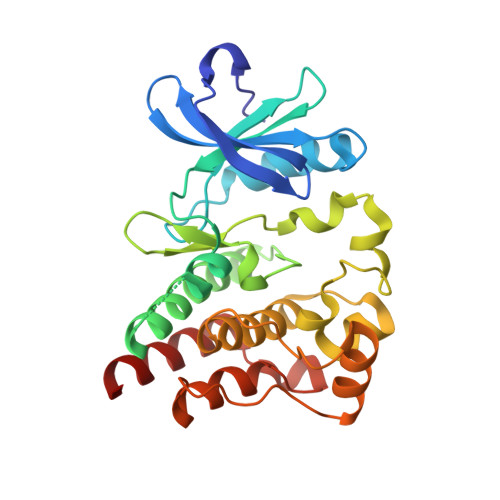Discovery of 6-Fluoro-5-(R)-(3-(S)-(8-fluoro-1-methyl-2,4-dioxo-1,2-dihydroquinazolin-3(4H)-yl)-2-methylphenyl)-2-(S)-(2-hydroxypropan-2-yl)-2,3,4,9-tetrahydro-1H-carbazole-8-carboxamide (BMS-986142): A Reversible Inhibitor of Bruton's Tyrosine Kinase (BTK) Conformationally Constrained by Two Locked Atropisomers.
Watterson, S.H., De Lucca, G.V., Shi, Q., Langevine, C.M., Liu, Q., Batt, D.G., Beaudoin Bertrand, M., Gong, H., Dai, J., Yip, S., Li, P., Sun, D., Wu, D.R., Wang, C., Zhang, Y., Traeger, S.C., Pattoli, M.A., Skala, S., Cheng, L., Obermeier, M.T., Vickery, R., Discenza, L.N., D'Arienzo, C.J., Zhang, Y., Heimrich, E., Gillooly, K.M., Taylor, T.L., Pulicicchio, C., McIntyre, K.W., Galella, M.A., Tebben, A.J., Muckelbauer, J.K., Chang, C., Rampulla, R., Mathur, A., Salter-Cid, L., Barrish, J.C., Carter, P.H., Fura, A., Burke, J.R., Tino, J.A.(2016) J Med Chem 59: 9173-9200
- PubMed: 27583770
- DOI: https://doi.org/10.1021/acs.jmedchem.6b01088
- Primary Citation of Related Structures:
5T18 - PubMed Abstract:
Bruton's tyrosine kinase (BTK), a nonreceptor tyrosine kinase, is a member of the Tec family of kinases. BTK plays an essential role in B cell receptor (BCR)-mediated signaling as well as Fcγ receptor signaling in monocytes and Fcε receptor signaling in mast cells and basophils, all of which have been implicated in the pathophysiology of autoimmune disease. As a result, inhibition of BTK is anticipated to provide an effective strategy for the clinical treatment of autoimmune diseases such as lupus and rheumatoid arthritis. This article details the structure-activity relationships (SAR) leading to a novel series of highly potent and selective carbazole and tetrahydrocarbazole based, reversible inhibitors of BTK. Of particular interest is that two atropisomeric centers were rotationally locked to provide a single, stable atropisomer, resulting in enhanced potency and selectivity as well as a reduction in safety liabilities. With significantly enhanced potency and selectivity, excellent in vivo properties and efficacy, and a very desirable tolerability and safety profile, 14f (BMS-986142) was advanced into clinical studies.
- Bristol-Myers Squibb Research and Development , P.O. Box 4000, Princeton, New Jersey 08543, United States.
Organizational Affiliation:

















